There is a certain group of people in Greater Taichung’s Situn and Nantun Districts with the surname “Liao” who get their surnames changed to “Chang” after they die. “Chang” is inscribed on their ancestral gravestones and this has become a special tradition in the area. Some of these people have even chosen the compound surname of “Chang-Liao” so that their names don’t have to be changed after they die.
The family names Chang and Liao originate from Zhangzhou, in China’s Fujian Province. Genealogic records suggest that a man surnamed Chang, who was known as “Chang the Honest,” living around the transition period between the Yuan and Ming Dynasties, married into a Liao family. Chang only had one son and to ensure that both names would continue to be passed on, he stipulated in his will that his descendants will be surnamed Liao to honor the maternal family, but they must have their surname changed to Chang when they die to preserve the paternal surname.
The ancestral home of the Liao family in Greater Taichung is the Chang-Liao Family Temple in Situn District and has been named a historical monument by Greater Taichung City Government.
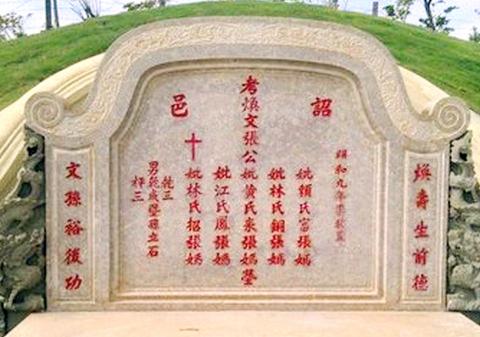
Photo: Lin Liang-che, Liberty Times
照片:自由時報記者林良哲
Taichung’s Liao family members use the surname Liao on their household registrations, identity card applications, military service documents or commercial contracts. However, as soon as they pass away, their surname must be changed to Chang on the family memorial tablets, gravestones, obituaries and family trees.
The tradition surrounding this surname is quite unique. In some cases, when people are not aware of the situation and receive an obituary notice with the surname Chang from a friend or parent surnamed Liao, they think it’s a mistake or a misdirected mail.
An example is the Liao Huan-Wen Tomb that is an official historical monument of Greater Taichung City Government. Liao Huan-wen used to live in Nantun. After he died, his descendents changed his name to Chang on the gravestone they made for him.
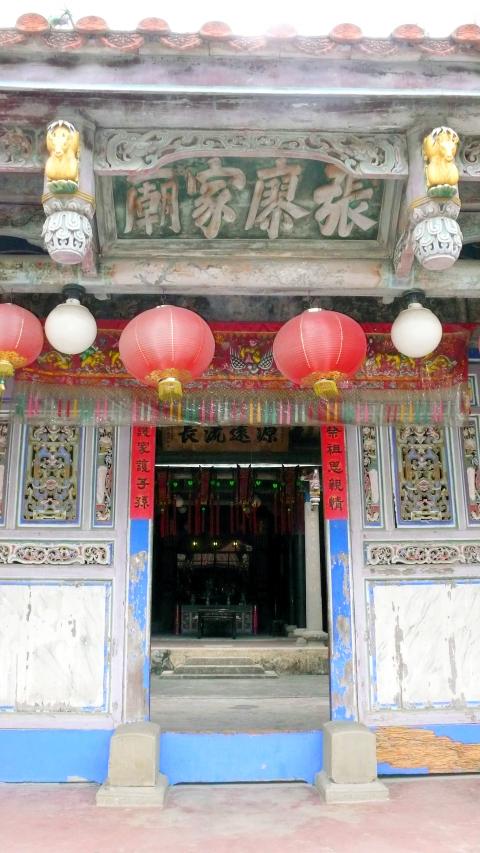
Photo: Lin Liang-che, Liberty Times
照片:自由時報記者林良哲
Besides Situn and Nantun Districts in Greater Taichung, this special tradition also exists in Yunlin’s Siluo Township. The well-known area known as the “Ci Kan of Siluo” was developed by Liao family members who came to Taiwan, and people there keep this tradition.
Although “living as a Liao and dying as a Chang” has become a tradition for some of the Liao families in Taichung’s Situn and Nantun Districts, some of them opted for the compound surname of “Chang-Liao,” so that they do not have to worry about their names being changed after they die.
(LIBERTY TIMES, TRANSLATED BY TAIJING WU)
台中市西屯、南屯一帶的廖姓家族姓氏會「轉換」,在活著時姓「廖」,過世則改姓「張」,祖先墓碑姓氏都是「張」,成為當地特殊的姓氏習俗,但其中一房則直接複姓為「張廖」,不再變換姓氏。
張廖氏始於中國福建省漳州府,根據族譜記載,元末明初時,張愿仔為廖家所招贅,後來他只生一子,為傳承二姓立下遺囑,規定「子孫生當廖姓,以光母族,死當姓張,以存父姓」。
廖姓家族台中市的祖厝是位於西屯區的「張廖家廟」,為台中市定古蹟之一。
台中廖氏家族中成員不管是戶籍、身分證、兵役資料、買賣契約等,都以廖姓來登記,但一過世,家中的神主牌位、墓碑、訃聞、族譜等,都要改為張姓。
此一姓氏習俗相當特殊,不知典故的人若是遇上廖姓友人的父母過世,接到訃聞,發現其載明為「張公」或是「張媽」,還以為寫錯了,或是發錯訃聞。
以台中市市定古蹟「廖煥文墓」來說,墓主廖煥文是南屯一帶名人,過世後,其子孫為他所營造的墓碑,也載明是「煥文張公」。
這種特殊的姓氏習俗除了在台中市西屯、南屯一帶外,也存在於雲林西螺,著名的「西螺七崁」正是由廖姓族人來台所開拓,也保留此一習俗。
雖然「活廖死張」是台中市西屯南屯一帶部份廖姓家族的傳統,但其中有一房卻直接複姓為「張廖」,不再生死兩姓。
(自由時報記者林良哲)
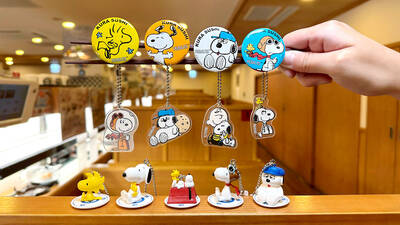
A: The news says comic superstar Snoopy’s birthday is coming soon on Aug. 10. B: So he’s a Leo, and his birthday will fall on this Sunday. A: Cartoonist Charles Schulz created the comic strip Peanuts, featuring Snoopy, in 1950. And this year marks the character’s 75th anniversary. B: No wonder there are some big celebrations in Japan, Hong Kong and elsewhere. How about Taiwan? A: The “How Do You Do, Snoopy?” exhibition is taking place in Taipei. Let’s go to Shin Kong Mitsukoshi Department Store’s A11 branch to see the show. A: 新聞說,卡通巨星史努比的生日是8月10日耶。 B: 原來史努比是獅子座,本週日就是他的生日。 A: 漫畫家查爾斯舒茲1950年在《花生》漫畫創造了該角色,今年正好歡慶75週年! B:
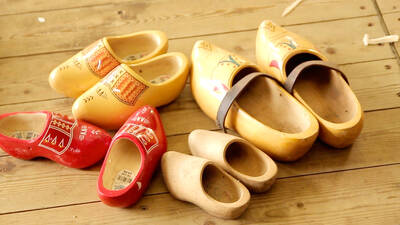
When you think of the Netherlands, images of tulips, windmills, and iconic wooden shoes — known as “Dutch clogs” — may come to mind. These traditional shoes are rich in cultural significance. For centuries, Dutch clogs have been admired for their sturdy design and impressive craftsmanship, making them a fascinating symbol of Dutch heritage. Dutch clogs date back to the Middle Ages. During that time, farmers and laborers needed durable shoes to cope with the region’s damp and unpredictable climate and topography. Crafted from solid wood, such as willow or poplar, clogs offered outstanding protection. Their firm structure kept

Bilingual Story is a fictionalized account. 雙語故事部分內容純屬虛構。 “One DA-BEI... WU LONG... NAI?” Yujing smiled as the foreigner struggled to order. He looked like an embarrassed puppy. She repeated the order in Chinese, then English: “Oolong milk tea, large size. Half sweet, no ice?” she said gently. He beamed — the kind of full-face, sunshine smile that Latinos are famous for. “Yes! That! You are... lo maximo… the best!” After he left, Lily nudged her. “Nice save. You’re getting the hang of it.” Yujing had taken this summer job at the bubble tea shop to build confidence and get work
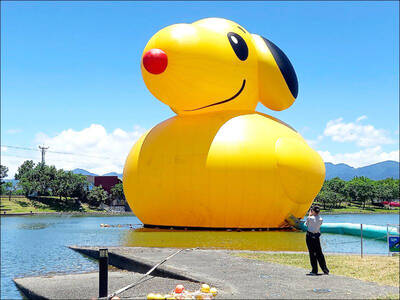
A: Apart from the “How Do You Do, Snoopy?” exhibition, the Penghu International Fireworks Festival displayed some Snoopy-themed balloon installation art. B: The Yilan International Children’s Folklore & Folkgame Festival also displayed a giant rubber “Snoopy Duck.” A: And Starbucks, Kura Sushi and 7-Eleven are all selling Snoopy-themed products. B: Starlux Airlines even launched new Snoopy-themed flights recently. Isn’t that cool? A: Taiwanese love Snoopy so much. Happy 75th birthday, Snoopy. A: 除了《How Do You Do, Snoopy?花生漫畫75週年特展》,澎湖海上花火節展出了史努比氣球裝置藝術。 B: 而宜蘭國際童玩藝術節,則展出了巨型「史努比鴨」。 A: 星巴克、藏壽司、7-Eleven也推出了史努比聯名商品。 B: 星宇航空今年更推出全新「Snoopy主題航班」,很酷吧? A: 台灣人好愛史努比啊,75歲生日快樂!